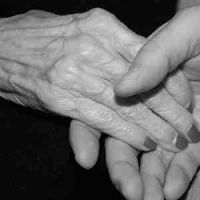Family members who make major medical decisions for relatives in the ICU may suffer post-traumatic stress disorder (PTSD) if they cope by avoiding the situation, according to a new study published in Critical Care Medicine. Researchers say family members tasked with the difficult role of decision-maker are better off health-wise dealing with the experience; otherwise they may struggle with guilt about whether they had done the right thing.
The study highlights the need of having a living will, or at least discussions about someone's wishes in case of major illness, said lead author Amy Petrinec, RN, PhD, Frances Payne Bolton School of Nursing, Case Western Reserve University.
Dr. Petrinec and colleagues studied three coping strategies for family decision-makers:
"We use all of these coping skills to one level or another in different situations, but people usually employ one predominant coping strategy in a particular situation," explained Dr. Petrinec.
The researchers surveyed 77 people about their initial coping skills three to five days after a family member entered the medical, neurological or surgical ICU in a large urban hospital, and then 30 days later to see if their coping strategies changed. Sixty days later, the subjects were tested for PTSD.
Results showed that 42 percent of family decision-makers had clinically significant PTSD symptoms. Death of the patient was a strong factor in predicting PTSD in the family decision-makers, regardless of coping style, the research team noted.
Source: Case Western Reserve University
Image credit: Flickr.com
The study highlights the need of having a living will, or at least discussions about someone's wishes in case of major illness, said lead author Amy Petrinec, RN, PhD, Frances Payne Bolton School of Nursing, Case Western Reserve University.
Dr. Petrinec and colleagues studied three coping strategies for family decision-makers:
- Emotional coping entails seeking emotional support or comfort from others, making jokes to lighten the situation or trying to see the situation in a new way.
- Problem-solving is action-driven by seeking information, making a plan and getting help or advice.
- Avoidance coping is not thinking or doing anything about the situation, drinking or using drugs to obliterate thoughts and denying the reality of the situation.
"We use all of these coping skills to one level or another in different situations, but people usually employ one predominant coping strategy in a particular situation," explained Dr. Petrinec.
The researchers surveyed 77 people about their initial coping skills three to five days after a family member entered the medical, neurological or surgical ICU in a large urban hospital, and then 30 days later to see if their coping strategies changed. Sixty days later, the subjects were tested for PTSD.
Results showed that 42 percent of family decision-makers had clinically significant PTSD symptoms. Death of the patient was a strong factor in predicting PTSD in the family decision-makers, regardless of coping style, the research team noted.
Source: Case Western Reserve University
Image credit: Flickr.com
References:
Petrinec AB et al. (2015) Coping Strategies and Posttraumatic Stress Symptoms in Post-ICU Family Decision Makers. Critical Care Medicine,
June 2015; 43 (6): 1205 DOI: 10.1097/CCM.0000000000000934
Latest Articles
healthmanagement, ICU, decision-making, emotional coping, avoidance coping, stress
Family members who make major medical decisions for relatives in the ICU may suffer post-traumatic stress disorder (PTSD) if they cope by avoiding the situation, according to a new study published in Critical Care Medicine.



























